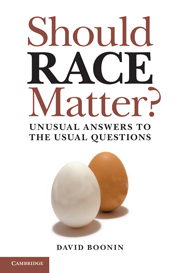Book contents
- Frontmatter
- Contents
- Preface
- 1 Thinking in Black and White
- 2 Repairing the Slave Reparations Debate
- 3 Advancing the Slave Reparations Debate
- 4 One Cheer for Affirmative Action
- 5 Two Cheers for Affirmative Action
- 6 Why I Used to Hate Hate Speech Restrictions
- 7 Why I Still Hate Hate Speech Restrictions
- 8 How to Stop Worrying and Learn to Love Hate Crime Laws
- 9 How to Keep on Loving Hate Crime Laws
- 10 Is Racial Profiling Irrational?
- 11 Is Racial Profiling Immoral?
- Notes
- Sources
- Index
1 - Thinking in Black and White
An Introduction to the Moral Questions that America’s Past Raises about Its Present
Published online by Cambridge University Press: 05 June 2012
- Frontmatter
- Contents
- Preface
- 1 Thinking in Black and White
- 2 Repairing the Slave Reparations Debate
- 3 Advancing the Slave Reparations Debate
- 4 One Cheer for Affirmative Action
- 5 Two Cheers for Affirmative Action
- 6 Why I Used to Hate Hate Speech Restrictions
- 7 Why I Still Hate Hate Speech Restrictions
- 8 How to Stop Worrying and Learn to Love Hate Crime Laws
- 9 How to Keep on Loving Hate Crime Laws
- 10 Is Racial Profiling Irrational?
- 11 Is Racial Profiling Immoral?
- Notes
- Sources
- Index
Summary
Two facts about black and white people in the United States give rise to a number of important moral questions. This book attempts to answer five of them. The two facts are that for much of our nation’s history, black people as a group were treated worse than were white people as a group and that by many uncontroversial measures of human well-being, black Americans on average aren’t doing as well today as white Americans are doing. The five moral questions that arise from these facts, and that constitute the subject of this book, concern the moral status of slave reparations, affirmative action, hate speech restrictions, hate crime laws, and racial profiling.
One way to respond to these five practices would be to focus on something they all have in common. All five practices involve treating racial distinctions, in one way or another, as morally relevant. Someone might claim that racial distinctions should never be treated as morally relevant, and so oppose all five practices. Or someone might claim that racial distinctions may always be treated as morally relevant, and so think that there’s nothing wrong in principle with any of them.
- Type
- Chapter
- Information
- Should Race Matter?Unusual Answers to the Usual Questions, pp. 1 - 23Publisher: Cambridge University PressPrint publication year: 2011



